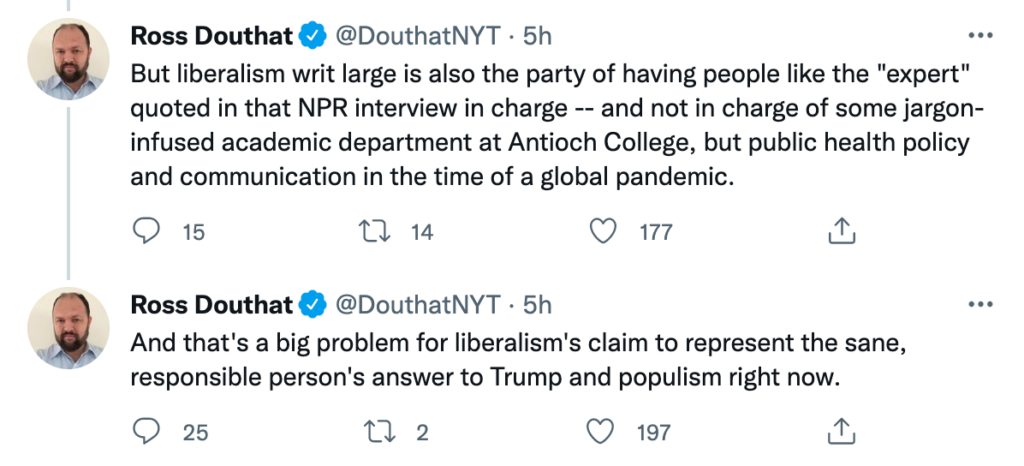The Lying Cathedral: Monkeypox Edition

A reader says that I should be using the NRX term "Cathedral" instead of "Regime" because it "highlights its missionary impulse, absolute certainty, self-righteousness, and eagerness to burn heretics." Of course. That said, Josh Barro, who is gay and disgusted by the squeamish way that the public health authorities talk about monkeypox, has a good post up with an example of what he cannot stand. It's a public radio interview with an Oregon state official. Barro says what's wrong with it is:
He fails to include developing knowledge about an ongoing outbreak in his public communication about how this outbreak is happening.
He lets woke ideology get in the way of clear communication.
He withholds information because he doesn’t trust the public to use it in the way he would like them to.
He unnecessarily alarms the broad public about a disease with fairly specific risk factors, while failing to effectively highlight those factors for those most at risk.
Quote from the interview with Dr. Tim Menza, who refuses to use the term "monkeypox," like the woke Oregon public radio person:
Chávez: Right now my understanding is that many of the cases in Oregon have been found in cisgender men who have sex with men. And I’m wondering how you are approaching public health messaging around this — resisting stigmatization and shame and blame while also still targeting those most at risk right now with resources.
Menza: It’s quite the challenge. What we’ve been trying to do as best as we can is stick with what we know.
In the United States, we know that people assigned male at birth who have sex with men and people assigned female at birth, including at least one pregnant person, have been affected by hMPXV in Oregon. We know that cisgender, men and nonbinary people are affected by hMPXV. While most identify as gay or queer and report close contact with people assigned male at birth, we have cases that also identify as straight and bisexual and report close contact with people assigned female at birth.
That being said, it is a challenge because just like you pointed out, we want to use our data to prioritize and drive our outbreak response. So from our perspective, Oregon Health Authority really needs to provide the people most affected including cisgender men who have sex with men, nonbinary folks and folks who identify as gay and bisexual with support care, vaccines and other prevention tools, especially when resources require thoughtful prioritization.
At the same time, we know that anyone can be affected by hMPXV. And so we want to provide a level of awareness to those who may not be affected to quite the degree that gay and queer men who have sex with men are affected. And so at times we do feel caught between how we communicate to the general public and then how we have another channel of communication to folks most affected by hMPXV. And our strategy has been this is to really use our community partners to do a lot of the community engagement and communication to folks who are most affected by hMPXV. Partly because … the messaging is best delivered by folks and organizations who know the communities best. And so our task has been trying to partner as much as possible to listen to those communities and to hear how best we can support [them].
Chávez: I understand there’s a push to change the naming convention for the virus itself and move away from calling it monkeypox. During this conversation, we’ve been referring to it as hMPXV. Why is that push happening?
Menza: The term monkeypox is problematic in a couple of ways. It places blame on other locations for the origin of the illness when right now it’s not affecting the [places] in which it typically circulates. Monkeypox is [also] kind of a misnomer in that the virus itself — we think that the natural hosts are actually rodents and not non-human primates. It just so happened that this virus was discovered in a primate lab and therefore was named for the first animal that humans saw it affect. So scientifically it may not be the most accurate term.
There is a great article by a number of African scientists really trying to promote a naming system and naming convention. And that’s what we’ve adopted at OHA — hMPXV. I know it doesn’t roll off the tongue. But we’re trying to be true to the statements of these African scientists, and their message to the world and to us, about how to message about an outbreak that is really not affecting the countries in which this is typically endemic.
Douthat points out that this kind of prissiness and woke obscurantism is typical of contemporary liberalism -- and why liberalism is so feeble when it comes to meeting political challenges:

Subscribe Today
Get daily emails in your inbox